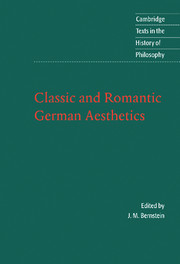Book contents
- Frontmatter
- Contents
- Introduction
- Chronology
- Further reading
- Note on the texts
- Aesthetica in nuce: A Rhapsody in Cabbalistic Prose (1762)
- Laocoön: An Essay on the Limits of Painting and Poetry (1766)
- From ‘On the Artistic Imitation of the Beautiful’ (1788)
- ‘Kallias or Concerning Beauty : Letters to Gottfried Körner’ (1793)
- ‘Oldest Programme for a System of German Idealism’ (1796)
- ‘Letter to Hegel, 26 January 1795’
- ‘Being Judgement Possibility’ (1795)
- ‘The Significance of Tragedy’ (1802)
- ‘Remarks on Oedipus’ (1803)
- From Miscellaneous Remarks (1797)
- ‘Monologue’
- ‘Dialogues’ (1798)
- ‘On Goethe’ (1798)
- ‘Studies in the Visual Arts’ (1799)
- From ‘Critical Fragments’ (1797)
- From ‘Athenaeum Fragments’ (1798)
- From ‘Ideas’ (1800)
- ‘On Goethe's Meister’ (1798)
- ‘Letter About the Novel’ (1799)
- ‘On Incomprehensibility’ (1800)
- Index
- Cambridge texts in the history of philosophy
‘Remarks on Oedipus’ (1803)
Published online by Cambridge University Press: 05 June 2012
- Frontmatter
- Contents
- Introduction
- Chronology
- Further reading
- Note on the texts
- Aesthetica in nuce: A Rhapsody in Cabbalistic Prose (1762)
- Laocoön: An Essay on the Limits of Painting and Poetry (1766)
- From ‘On the Artistic Imitation of the Beautiful’ (1788)
- ‘Kallias or Concerning Beauty : Letters to Gottfried Körner’ (1793)
- ‘Oldest Programme for a System of German Idealism’ (1796)
- ‘Letter to Hegel, 26 January 1795’
- ‘Being Judgement Possibility’ (1795)
- ‘The Significance of Tragedy’ (1802)
- ‘Remarks on Oedipus’ (1803)
- From Miscellaneous Remarks (1797)
- ‘Monologue’
- ‘Dialogues’ (1798)
- ‘On Goethe’ (1798)
- ‘Studies in the Visual Arts’ (1799)
- From ‘Critical Fragments’ (1797)
- From ‘Athenaeum Fragments’ (1798)
- From ‘Ideas’ (1800)
- ‘On Goethe's Meister’ (1798)
- ‘Letter About the Novel’ (1799)
- ‘On Incomprehensibility’ (1800)
- Index
- Cambridge texts in the history of philosophy
Summary
It would be good, here as well, if, in order to secure a civil existence for the poets, differences of time and situation notwithstanding, one elevated poetry to a craft [mechane], to the level of the ancients.
Other works of art too lack this reliability compared to the Greek works; they have, at least up to now, been judged more according to the impression they make, than according to the lawful calculation and other procedures through which beauty is brought out. Modern poetry especially lacks the schooling and dexterity which would allow it to be calculated and learned, and once learned, allow it to be reliably repeated in its practice. Among humans one must above all be concerned in each thing, that it is something, that is, that it be recognized in its way of appearance, that the way it is conditioned can be determined and taught. For this and higher reasons, poetry requires especially secure and characteristic principles and boundaries.
Lawful calculations are needed here as its first component.
Then one ought to consider how the content differs from it, through which processes, and how, in the infinite but persistently determinate connection, the particular content relates to the general calculation; and how the course of events and that which is to be established, the living meaning which cannot be calculated, are brought into a relation with the calculable law.
- Type
- Chapter
- Information
- Classic and Romantic German Aesthetics , pp. 194 - 202Publisher: Cambridge University PressPrint publication year: 2002
- 1
- Cited by

